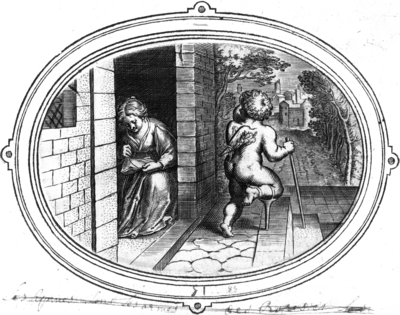Otto Vaenius, Amorum emblemata (1608)
Table of contents ↑Celerem habet ingressum amor, regressum tardum [83]

Translations
 |
[Publilius Syrus] Liefde komt snel en gaat traag. |
 |
[Publilius Syrus] Love is quick in coming in, and slow in departing. |
Sources and parallels
- Ayres, Emblemata amatoria
 , embl. 23
, embl. 23 -
Parallel for the pictura (mirrored, less detailed) and for the mottoes (some not exactly or partly): Un Cupidon qui sort de chez sa Belle
 (in: Daniel de la Feuille, Devises et emblemes (1691)
(in: Daniel de la Feuille, Devises et emblemes (1691) )
[Compare
)
[Compare ]
]
-
Same pictura, woman with a love letter (instead of needlework), woman waiting in doorway in background, different
motto and Latin subscriptio:Serus in amore exitus. [23]
 (in: anonymous, Emblemata amatoria (1690)
(in: anonymous, Emblemata amatoria (1690) )
[Compare
)
[Compare ]
]
-
A woman doing some needlework in:Post tristia dulcor. [38]
 (in: Jacob Cats, Sinne- en minnebeelden (1627)
(in: Jacob Cats, Sinne- en minnebeelden (1627) )
[Compare
)
[Compare ]
]
-
A woman doing some needlework in:Post tristia dulcor. [37]
 (in: Jacob Cats, Proteus (1618)
(in: Jacob Cats, Proteus (1618) )
[Compare
)
[Compare ]
]
-
Source for: Celerem habet ingressum Amor, regressum tardum [47]
 (in: Otto Vaenius, Emblemata aliquot selectiora amatoria (1618)
(in: Otto Vaenius, Emblemata aliquot selectiora amatoria (1618) )
[Compare
)
[Compare ]
]
References, across this site, to this page:
- Post tristia dulcor. [37]
 (in: Jacob Cats, Proteus (1618)
(in: Jacob Cats, Proteus (1618) )
)
- Flamma fumo proxima. [17]
 (in: Jacob Cats, Sinne- en minnebeelden (1627)
(in: Jacob Cats, Sinne- en minnebeelden (1627) )
)
- Post tristia dulcor. [38]
 (in: Jacob Cats, Sinne- en minnebeelden (1627)
(in: Jacob Cats, Sinne- en minnebeelden (1627) )
)
- Serus in amore exitus. [23]
 (in: anonymous, Emblemata amatoria (1690)
(in: anonymous, Emblemata amatoria (1690) )
)
- Un Cupidon qui sort de chez sa Belle
 (in: Daniel de la Feuille, Devises et emblemes (1691)
(in: Daniel de la Feuille, Devises et emblemes (1691) )
)
- Celerem habet ingressum Amor, regressum tardum [47]
 (in: Otto Vaenius, Emblemata aliquot selectiora amatoria (1618)
(in: Otto Vaenius, Emblemata aliquot selectiora amatoria (1618) )
)

